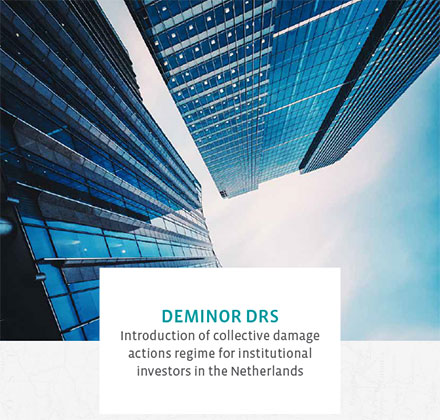The Dutch Act on Collective Damage Actions (adopted in March of this year, and soon to come into effect) will introduce collective “opt-out” litigation for damages in the Netherlands for the first time. A claim vehicle will have the possibility of litigating for damages on behalf of an entire class of investors. At first glance, this new option for collective litigation seems to be a preferable alternative to traditional “opt-in” litigation. An investor can remain passive and still receive compensation — a situation resembling the US class action system. Yet, I think there is an important catch here!
Lead plaintiff in a US class action & in the Netherlands
Being a lead plaintiff in a US class action requires a substantial investment from the party in question, not just in terms of expenses, but also the significant amount of time, manpower and skills that are dedicated to the proceedings. This is not the case for litigation in the Netherlands. The Netherlands does not know the concept of document production related to pre-trial discovery. Furthermore, plaintiffs are not obliged to make depositions, to complete interrogatories or to appear before the judges during the litigation. The level of involvement by investors in traditional “opt-in” litigation for damages is therefore limited and generally does not extend beyond presenting evidence of their investments.
So, on further examination, the Dutch Act on Collective Damage Actions is actually more advantageous for claim vehicles than it is for institutional investors. These claim vehicles will now be able to litigate without having to collect mandates from investors, while the difference for institutional investors when it comes to their required level of involvement in the proceedings is only marginal.
“Opt-in” vs. “opt-out” actions
Where I expect to see a significant difference for investors, is when it comes to the percentage of compensation on their losses suffered. In “opt-in” actions for damages, the sole purpose of the action is to obtain compensation for those investors that have chosen to actively litigate. In “opt-out” actions, however, the aim is to compensate the entire class. The ‘pie’ must be shared with everyone, but the pie is not necessarily any bigger, resulting in a smaller share for individual investors.

My expectation, therefore, is that, similar to US class actions, “opt-out” actions for damages in the Netherlands will, on average, result in low-single digit percentages of compensation. When you compare this to average figures of over 40 percent compensation on losses that Deminor has obtained for its clients through traditional “opt-in” litigation over the years, it is clear that remaining passive may not always be the best option, especially given that litigation in the Netherlands requires only a low level of involvement from the investor (as explained above).
The difference between what an active investor could have recovered by participating in an “opt-in” action for damages compared to what an investor receives as a class compensation through an “opt-out” action for damages, could be called “the passivity cut”. It is the price that is paid for not making the (relatively small) effort of becoming active on a case.
Deminor regularly advises institutional investors on actions proposed by Dutch claim vehicles, such as foundations and associations. If you wish to receive our advice on a proposed action, do not hesitate to contact us.
We have also prepared an extensive guide on the newly adopted Dutch Act on Collective Damage Actions. You can download this guide for free here.






